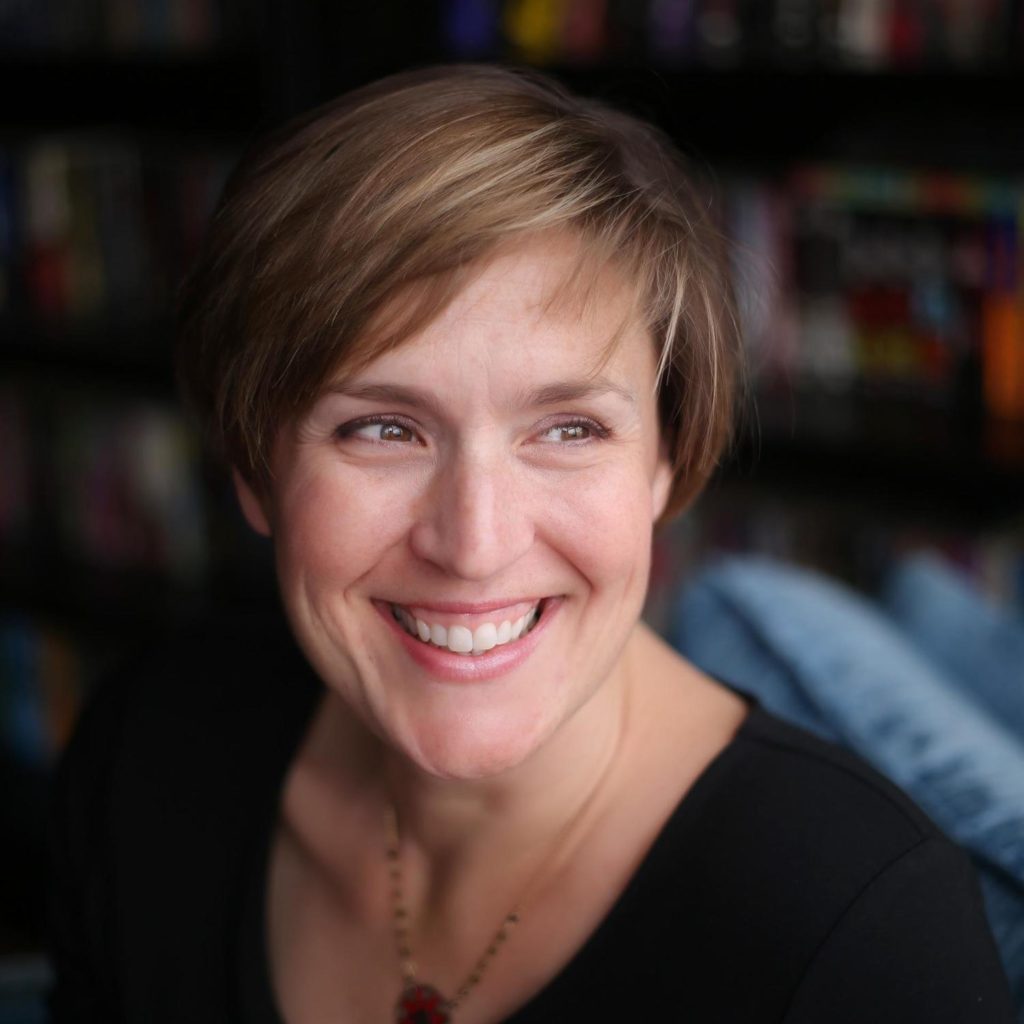
About the Author: Jennifer Latham is an army brat who was born on the Upper East Side of New York City and ended up in Tulsa, Oklahoma with her husband and two daughters. Go figure. In between, she’s lived throughout the United States and in Madrid, Spain. She studied Economics and Anthropology at Swarthmore College, left her PhD in Clinical Psychology at the altar, and has worked in prisons, heroin detox units, middle schools, high schools, and at more temporary gigs than she cares to remember. At present, she’s a certified yoga teacher, ineffectual dog trainer, reluctant haus frau, and devoted writer.
Dreamland Burning, Jen’s second novel, received starred reviews from Kirkus Reviews, Booklist, and School Library Journal, was an Amazon Editors’ Top 20 YA Book of 2017, a New York Public Library Top YA of 2017, a Chicago Public Library Best of the Best Teen Book of 2017, a Shelf Awareness Top Teen Book of 2017, a YALSA Quick Pick for Reluctant Young Adult Readers, and was recognized with an honorable mention for the Grateful American Book Prize.
Find Jennifer Latham on the following platforms:
Jennifer Latham: We live in an old house with a garage that was converted into a small apartment in the 1940s. For the most part, I worked on Dreamland Burning back there. And while our house isn’t a mansion like Rowan’s, this was what inspired the scene where she finds the skeleton in the book. That said, one of my favorite indulgences is working in bed— especially on rainy mornings!
JL: So many things! I’ll list just a few. 1) Be patient. Everything about both writing and publishing will take a lot longer than you think. 2) Be realistic. Hitting the NY Times Best Seller List would be great (obviously!), but don’t forget that getting a book published in the first place is a huge victory. 3) Work on your craft. Just because you’re good with words doesn’t mean you’ve mastered the art of constructing a novel. 4) Enjoy. It’s easy to lose sight of how lucky you are to be able to share your stories. At the end of the day, that’s what it’s all about.
JL: Not really. I started stapling together loose sheets of paper to make “books” as soon as I could work a stapler. But there was a specific period about eleven years ago when I was deciding on finishing my lapsed Psychology Ph.D. or making a serious effort to write a book. The book won, and though my first manuscript hasn’t been published, I am so, so glad I chose writing.
JL: I’m a pretty pragmatic, down-to-earth person, so everyday experiences will always find their way into my stories no matter how ramped up the mystery gets. I love watching people, imagining their lives, and seeing beauty in the little everyday exchanges we have with one another and the little things we all do to get through our days. Depicting the everyday experiences we share as human beings will always be at the heart of my writing.
JL: Absolutely. Stephen King’s On Writing is the only “writing” book I’ve read, and I really learned a lot from it. Mostly, though, my eyes have been opened by works of fiction. For example, Jacob Have I Loved by Katherine Paterson taught me that sometimes it’s easier to identify with flawed protagonists who make bad decisions than it is to identify with perfect ones. Dept. of Speculation by Jenny Offill showed me how sometimes the best way to depict intense emotional experiences is to use fewer words rather than more. And right now, I’m finishing Lincoln in the Bardo by George Saunders. Normally, I’m not a huge fan of experimental fiction, but the way he wrote this is so deft and compelling that it’s making me think about how stories actually take root and bloom.
JL: A visit to the Greenwood Cultural Center with a group of seventh and eighth graders. The Center is located in the area that was destroyed in 1921, and has a back hallway lined with black and white photographs of elderly Tulsans who survived the race riot/massacre when they were children. Their eyes were so full of stories that I sought out their stories. Listening to voice recordings with a few of them and reading transcribed interviews with others was what made me want to learn more and write about what I’d found.
JL: I want my books to depict the world as it actually is.
JL: Perhaps, though I wouldn’t say they’re the only genres I’m interested in writing. When you get right down to it, every novel is a mystery at its heart. Plus, I’m a nerd with lots of background in research, which makes learning about history right up my alley. The other benefit of writing historical fiction is that it gives you scaffolding to build your plot on. Plotting is hard. I’ll take all the help I can get.
JL: As with all recommendations, these should be taken with a grain of salt. What works for me might be a disaster for another writer. That said, here are a few things I’ve found helpful: 1) Write different characters on different days, and don’t move on until you’ve completed a given character’s section. 2) Don’t settle on a character’s voice until you can see it, feel it, hear it, etc. inside your head as an independent entity. 3) Give each voice its own rhythm, accents, syntactic quirks, etc. Putting the characters in different time periods, generations, or geographic regions makes this easier.
JL: More work. More practice. More honing my craft. And with any luck, more books!
PRR Writer, Nora Gaarder